The year is 1972, and with the success of Godzilla and Ultraman tokusatsu superhero series have truly landed in Japan. With the Ultra Series entering its fifth instalment (Ultraman Ace) and Toei making groundwork with the original Kamen Rider, Kikaider and more it seems everyone wants a taste of this success. One of the lesser known shows from this era is Iron King, a 26-episode series created Ultraman/Ultra Seven writer Mamoru Sasaki. Airing from October 1972 to April 1973, the series never quite took off in the same way as its rivals but remains an interesting piece of tokusatsu history.
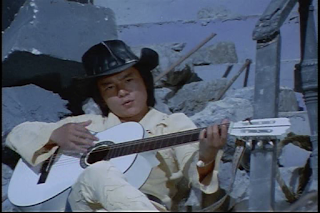 |
| The scoundrel of tokusatsu |
After 2000 years of planning the Shiranui Clan have returned to conquer Japan, taking revenge on their banishment by the Japanese people’s nomadic ancestors the Yamato Clan. To exact their plans, each clan member controls a giant robotic warrior. To counter the threat, Japan’s National Security Organisation sends their best agent, Gentaro Shizuka, to stop their plans. Much to his behest, he is also teamed up with the bumbling Goro Kirishima in this task.
However Goro also has a secret completely unknown to Gentaro. By touching the medals on the sides of his hat and crying “Iron Shock!”, he is able to transform into the giant robot superhero Iron King. Together with Gentaro they fight against the threat of the Shiranui Clan and their robots, as well as later facing two new forces – the Phantom Militia and the masked Titanian aliens.
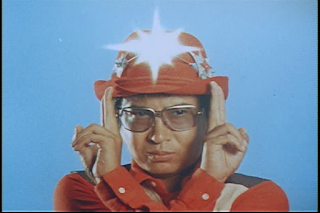 |
| Switch on? |
Firstly it’s important to note that Iron King isn’t exactly the height of originality. If the titular character’s knock off Ultraman appearance wasn’t enough to convince you of this, then there are plenty of other similarities to do the trick. Following Goro’s Kikaider-esque transformation pose comes a growth sequence that’s ripped straight out of Ultraman, and it doesn’t stop there either. Iron King runs on hydroelectric power, and when he begins to run out of water not only does he get significantly weaker but a light will begin flashing on his chest as a warning. Given how closely this parallels Ultra Heroes’ colour timer, it’s fair to say Iron King’s creators weren’t even trying to make their hero unique. In general Iron King is a series that tries incredibly hard to ride the coat tails of Ultraman’s success, and it painfully shows.
Not just content with setting itself out as an Ultraman rip-off from the get-go, Iron King also makes sure it can cover as many bases as possible when it comes to tokusatsu/henshin hero tropes. 26 episodes is barely enough time to flesh out one set of villains, but Iron King manages to cram three into that space. The Shiranui Clan take the first ten episodes, with the Phantom Militia taking over in the next nine and then the Titanians for the final eight. The Shiranui and the Titanians both have their own unique back stories, but the Phantom Militia just exist and that’s that. It gives the show some variety since the three groups all look different and have wildly different looking robots/monsters, but it means ongoing storylines and development are almost non-existent. Both the Shiranui Clan and the Phantom Militia suffer from having no clear plans during the entirety of their runs. Every episode seems to just revolve around killing Gentaro and through that somehow the world will be theirs – even Iron King himself is barely a footnote worth mentioning most of the time. Every episode just feels like exactly the same thing, with only the minor details and giant monster changed. Things only really begin to pick up with the arrival of the Titanians, who do actually have a stock of basic toku plots (steal the scientist’s secret formula etc.) up their sleeves. This final arc noticeably raises the stakes for our heroes and actually has some semblance of an ongoing plot, but despite the raise in quality it’s too little too late to pull Iron King out of anything other than mediocrity.
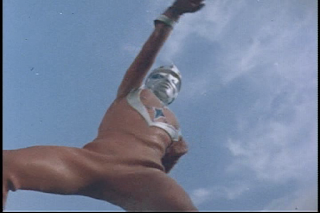 |
| ULTRA similar |
What makes Iron King stand out however is its characters, and the interesting dynamic that it sets up. It’s rare to find a series where the titular hero is the sidekick rather than the main character, and creates a set-up where very little of the show revolves around Iron King himself. Having cast then-popular musician Shoji Ishibashi in the role it’s no surprise that Gentaro ultimately takes centre stage, but for all intensive purposes he’s just a man. There no superpowers or mask, he’s just a man in a cowboy getup with a fancy utility belt. Even when Iron King is grappling with giant monsters its often Gentaro that actually saves the day, destroying the monster by climbing up on it and blowing it up or a variety of other over the top ways. The other big factor is that Gentaro isn’t a hero of justice or anything quite so noble – in fact he’s actually a bit of a dick. Always concerned with the bigger picture and defeating the enemy, Gentaro isn’t above leaving hostages to die, using innocents as bait or slapping a woman in the face. In the early episodes this naturally leads to a rather strained relationship with Goro, with Gentaro seeing his partner as dead weight (and he isn’t wrong, Goro is pretty damn useless when he’s not Iron King). However over the course of the show the pair eventually warm up to each other, becoming something of a double act when it comes to slacking off and hitting on women. It’s an odd dynamic that really works for them, as neither character feels particularly heroic even though by the end of it they’ve single-handedly saved the world three times over.
Iron King also features numerous episodic characters, a few of which stick around for more than one episode. Pretty much all of them that matter are female, and the series isn’t particularly kind to any of them. The first recurring female character that shows up ends up dead shortly afterward, and there are a fair few that follow after that. One character even picks up on the trail of heartache and dead bodies Gentaro seems to be leaving, because if it isn’t them that’s dying its someone close to them instead. During the Phantom Militia arc a good number of the plots have to do with the loved ones of Militia members, which usually doesn’t work out all that well for the parties involved. Despite all the womanising that goes on in Iron King, there is isn’t actually any specific love story to speak of since half the time it ends with Gentaro being typically cold-hearted. The one recurring female that does have some semblance of a happy ending is National Security Organisation Junko, who turns up during the show’s final arc. She’s the only one treated as anything more than lovesick hindrance, but even then Gentaro and Goro tease her for being too stuck up. Basically no character in this show matters except Gentaro and Goro, to the point where it seems to actively make the other characters unlikeable to keep them in the spotlight.
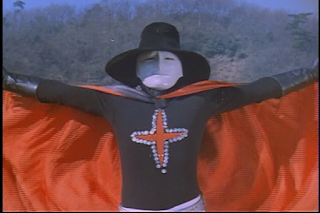 |
| Anonymous circa-1972 |
Unfortunately Iron King doesn’t have a lot going for it from a production standpoint either. It’s abundantly clear that Nippon Gendai/Senkosha Productions didn’t have the same budget that Toei or Tsuburaya Productions had to play about with, as cheap looking monster costumes is common among all three villain factions that appear in the show. The Shiranui Clan’s robots are probably the best looking of the bunch from a technical standpoint, but with very few differences between each one they quickly get rather dull. The Phantom Militia’s dinosaur robots and Titanian insectoids are far more varied and memorable, but are the epitome of cheap looking monster costumes. Whereas the Showa era Kamen Rider, Super Sentai and Ultraman monsters usually show a level of timeless ingenuity that negates how dated they’ve become, Iron King’s for the most part are flat out bad. The lower-end production values also bleed through to the action sequences, which largely consist of poorly choreographed wrestling and sneaky cuts to avoid showing contact between the two suit actors (the latter also often applies to the stuntmen in Gentaro’s fight scenes). However one area the series does deserve praise is its sets and miniatures, which aren’t quite up to Ultraman or Godzilla’s high standards but still extremely impressive in their own right. Even though Iron King shows its age far more than its contemporaries, it’s still a great example of the style and craft that makes tokusatsu so endearing to its fans.
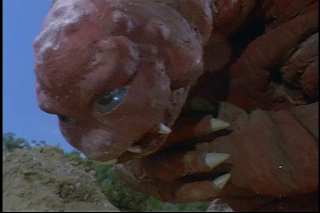 |
| Minilla gone wild |
Iron King is a pretty ridiculous series, and it’s a pity that it’s in more bad ways than good. The interesting character set up gives the show a lot of initial promise, but this is quickly marred by the lack of any real ongoing plotlines, underwhelming visuals and the absence of any real character development or growth. The third arc is where it begins to show some real potential, but by that point there are only eight episodes left and the damage has already been done. It’s quite easy to see why Iron King never had the same success as Ultraman and eventually fell into tokusatsu obscurity, but with the full set available for a mere $6 on Amazon it’s worth checking out if only to get a taste of something outside the bigger franchises.


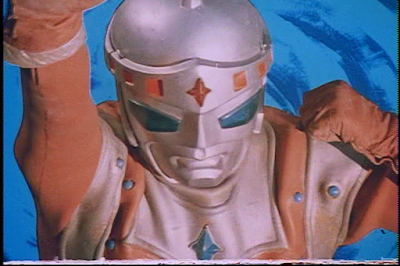

2 comments:
Haha! You have to admit that this show had a catchy theme song. I enjoyed the show, though I agree that it didn't offer anything unique and the plot pretty much recycyled with each new foe being introduced.
I agree it is an Ultraman knock off, but I remember watching it years ago when I bought the series on DVD and really enjoying it because it has a different aesthetic. Instead of a whole team operating out a HQ (even though that happened during the Titanian Invasion Arc), most of the series involved Gentaro and Goro roaming the country side and camping instead of staying in hotels or whatnot. In some ways that kind of reminded me of the early seasons of Supernatural with the Winchester brothers.
I do agree that I wish there had been more depth to the concept or more time to allow depth of characters and concept. Also I wasn't a fan of Gentaro only catching on to Goro being Iron King literally in the final episode.
Post a Comment